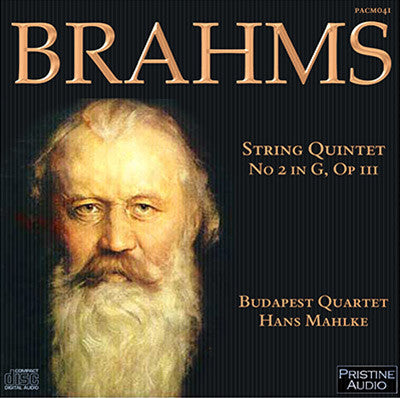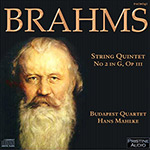
This album is included in the following sets:
This set contains the following albums:
- Producer's Note
- Full Track Listing
- Cover Art
Brahms' Second String Quintet
The Budapest Quartet's 1932 classic, remastered for finest sound quality
"I've been tormenting myself for a long time with all kinds of
things, a symphony, chamber music and other stuff, and nothing will come
of it. Above all I was always used to everything being clear to me. It
seems to me that it's not going the way it used to. I'm just not going
to do any more. My whole life I've been a hard worker; now for once I'm
going to be good and lazy!"
These words, spoken by Brahms in the
summer of 1890 to his friend Eusebius Mandyczewski, indicated the
composer's plan that his String Quintet in G major would be his final
work. Despite its difficult opening, where somehow the cello has to make
itself heard from beneath the rest of the players' forte semiquavers,
caused much consternation amongst the members of the Rosé String Quartet
who began rehearsing it for the first time in November 1890 with Brahms
in Vienna ("the cello...must scrape mercilessly to be heard" warned
cellist Elisabet von Herzogeberg). Despite these warnings, and those of
Brahms' great friend and ally Joachim, the composer let it stand. The
première in Vienna on November 11th, 1890, was a fabulous success.
But
the Quintet was not to be Brahms' final work - the experience of its
composition and the sensational reaction to its appearance, led the
composer to reconsider. telling a friend:
"Recently I started
variuos things, symphonies and so on, but nothing would come out right.
Then I thought: I'm really too old, and resolved energetically to write
no more. I considered that all my life I have been sufficiently
industrious and had achieved enough; here I had before me a carefree old
age and could enjoy it in peace. And that made me so happy, so
contented, so delighted - that all at once the writing began to go."
This
1932 recording shows little to belie its age. Perhaps the very finest
detail is to an extent sacrificed for a more overall rounded sound, but
it really is a treat for the ears. Hearing this performance, made just
42 years after the work's première, one senses that it would have made a
perfect end to Brahms' career. But knowing what it inspired in him, at
least partly, to go on to produce, one can also be glad that it was not
the end of his music.
Andrew Rose
BRAHMS String Quintet No 2 in G, Op 111
Recorded on 15, 17 November 1932, Beethovensaal, Berlin
All 1st takes except sides 3 & 5, take 2.
Issued as HMV DB.1866-8 Matrix Numbers:32-3497/3501, 32-3512
Total Duration: 22:57
The Budapest Quartet:
Josef Roismann, violin
Alexander Schneider, violin
Boris Kroyt, viola
Mischa Schneider, cello
with:
Hans Mahlke, viola

